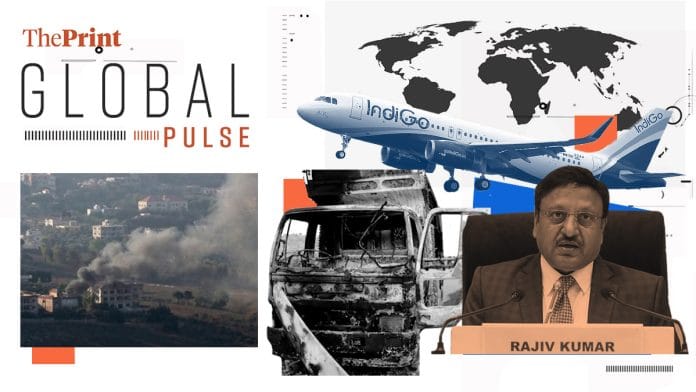New Delhi: Despite the challenges and risks of running airlines in India, businessmen Rahul Bhatia and Rakesh Gangwal defied the odds and ended up seeing success, becoming billionaires on the back of IndiGo—the airline they founded in 2006, writes The Economist.
In an article titled India’s largest airline is flying high, The Economist notes that IndiGo ranks among the top 10 airlines globally by flight numbers. The airline, now celebrating 18 years, has cornered over 60 percent of the domestic market alone, compared to the American market, where the top four airlines together make up 69 percent, it adds. IndiGo has also remained largely profitable, except during the pandemic, and ordered 500 planes in June.
What makes the airline unusual, The Economist writes, is that despite being a low-cost carrier, it has set out a vision to expand its new business-class services, frequent-flyer programme, and long-haul flights starting in 2027. Its focus on cost-efficiency and strategic planning positions it well for future growth in a challenging market, the magazine concludes.
Journalist Murali Krishnan discusses the upcoming assembly elections in Jammu and Kashmir in an article for Deutsche Welle (DW). He writes that regional parties such as the Peoples Democratic Party and the National Conference are seeking restored statehood and increased local powers, while analysts view the elections as a gauge of public sentiment, noting that they will be a precursor to potential future political changes.
These elections will be crucial as they will finally give people a chance to show how they feel about Jammu and Kashmir being divided and turned into a Union territory, according to Radha Kumar, a former Kashmir interlocutor and a specialist on peace and conflict in South Asia.
“The people’s response to these events will be expressed in this election. I am sure that parties which opposed the Modi administration’s actions will do very well,” Kumar told DW.
In a report for Bloomberg, journalist Chiranjivi Chakraborty discusses the planned introduction of a new pension system for central government employees—the Unified Pension Scheme—starting next April. Chakraborty links the move by the Narendra Modi government to the Bharatiya Janata Party attempting to improve its standing ahead of the upcoming state assembly elections.
A BBC report (Rampant harassment and no toilets: Report exposes Kerala film industry) discusses the Hema Committee report on the conditions women face in the Malayalam film industry.
The 290-page report revealed that the industry is controlled by a “mafia of powerful men” and that sexual harassment is widespread and unchecked, write BBC journalists Geeta Pandey, Meryl Sebastian and Imran Qureshi.
“In the week since its release, the report has created ripples in the state, with activists and prominent opposition leaders demanding action against those accused of wrongdoing,” write the BBC journalists.
22 killed in Balochistan, Netanyahu vows to continue attacks
In an overnight attack on a highway in Pakistan’s Balochistan province, gunmen killed at least 22 people from the Punjab province, the BBC reported. They forced the passengers of at least 22 vehicles travelling to and from the province to stop, checked their identities and shot those from Punjab, officials say. This was just one among a number of attacks across the province that were claimed by separatist militants and saw more than 50 people killed, Reuters reported.
Israeli Prime Minister Benjamin Netanyahu has vowed that Israeli air raids that targeted Hezbollah rocket sites in southern Lebanon Sunday were “not the end of the story”. The warning came after the two sides exchanged their heaviest fire since the start of the war in Gaza in October, raising fears of an all-out regional conflict. To know more, read the latest report by The Guardian.
(Edited by Sanya Mathur)






